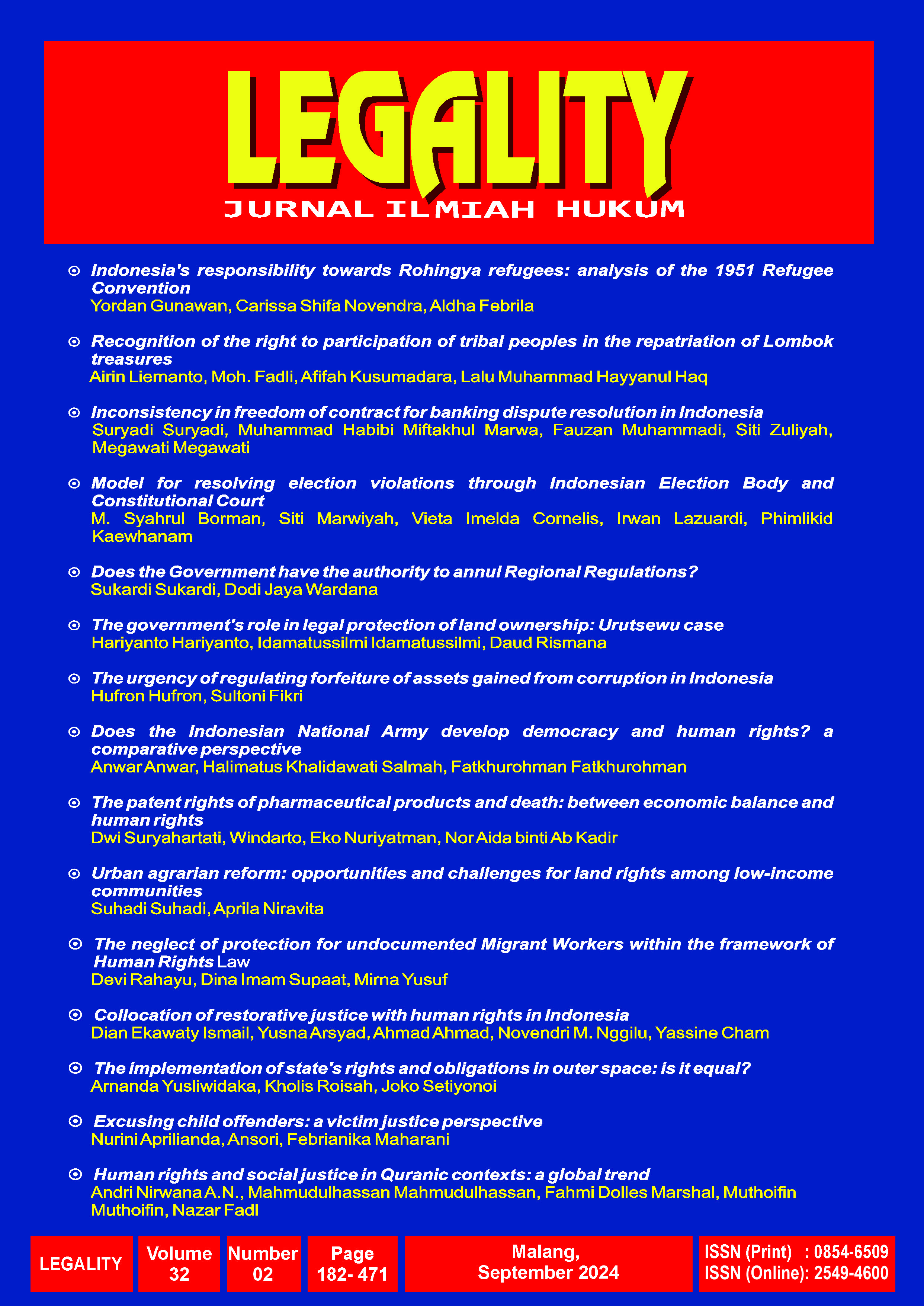The implementation of state's rights and obligations in outer space: is it equal?
DOI:
https://doi.org/10.22219/ljih.v32i2.35312Keywords:
Outer Space, Equality of State, International CooperationAbstract
The provisions of Outer Space Law govern a state's activities in outer space. The implementation of such activities needs advanced technology, which limits the ability of many countries to explore and exploit outer space. Data indicates that developed nations dominate outer space management, leaving countries without access to sophisticated technology unable to participate fully in space exploration and exploitation. This dominance triggers disparity between developed and developing countries, leading to unequal application of rights and obligations as outlined in Outer Space Law. While the law promotes international collaboration to address this issue, it does not explicitly require developed countries to involve developing nations in outer space activities. This study aims to refine the concept of international collaboration to ensure fair management and exploitation of outer space by all countries. This study is normative in nature, focusing on evolving the concept of international collaboration in outer space. Primary and secondary legal materials and non-legal sources were used as secondary data collected through a literature review and analysed qualitatively. The developed concept emphasises international cooperation and mutual assistance, proposing a framework for collaboration between developed and developing countries. This concept seeks to ensure equitable management of outer space. It reshapes the rights and obligations of states by encouraging all launching states to involve developing countries in space exploration and exploitation.
Downloads
References
Abdurrasyid, P. (2006). Kebutuhan Perangkat Hukum Nasional dan Internasional dalam Rangka Penataan Dirgantara Nasional. Indonesian Journal of International Law, 3(2). https://doi.org/10.17304/ijil.vol3.2.394
Blount, P. J. (2021). Peaceful Purposes for the Benefit of All Mankind In: War and Peace in Outer space. Oxford University Press.
Chai, W. (2023). Five Eyes Alliance. https://www.techtarget.com/whatis/definition/Five-Eyes-Alliance
Dai, X., Snidal, D., & Sampson, M. (2010). International Cooperation Theory and International Institutions. In Oxford Research Encyclopedia of International Studies (Issue July). https://doi.org/10.1093/acrefore/9780190846626.013.93
Data, O. W. in. (2023). Cumulative number of objects launched into outer space. https://ourworldindata.org/grapher/cumulative-number-of-objects-launched-into-outer-outer space?country=OWID_WRL~USA~RUS~CHN~GBR~JPN~FRA~IND~DEU~European+Outer space+Agency
Depri Liber Sonata. (2014). Metode Penelitian Hukum Normatif dan Empiris: Karakteristik Khas dan Metode Penelitian Hukum. Fiat Justisia Jurnal Ilmu Hukum, 8(1), 15–35.
Durrani, H. (2019). Is Spaceflight Colonialism? The Nation. https://www.thenation.com/article/world/apollo-space-lunar-rockets-colonialism/
Fajar, M., & Achmad, Y. (2019). Dualisme Penelitian Hukum Normatif & Empiris. Pustaka Pelajar.
Gabrynowicz, J. I. (1992). The Province and Heritage of Mankind Reconsidered: A New Beginning. Conference on Lunar Bases and Space Activities of the 21st Century, 2.
Kelsen, H. (1944). The Principle of Sovereign Equality of States as A Basis for International Organization. The Yale Law Journal, 53(2).
Lee, T. H. (2004). International Law International relations theory, and preemptive war : the vitality of sovereign equality today. Law and Contemporary Problems, 67(4), 147–167.
Mineiro, M. C. (2008). FY-1C and USA-193 Asat Intercepts: An Assessment of Legal Obligations Under Article IX of The Outer space Treaty. Journal of Outer Space Law, 34(2).
Muhaimin. (2020). Metode Penelitian Hukum. Mataram University Press.
Declaration on Principles of International Law concerning Friendly Relations and Cooperation among States in accordance with the Charter of the United Nations, (1970).
United Nations Convention on the Law of the Sea, (1982).
Resolution General Assembly United Nation A/RES/51/122, Declaration on International Cooperation in the Exploration and Use of Outer space for the Benefit and in the Interest of All States, Taking into Particular Account the Needs of Developing Countries, (1997).
Noichim, C. (2008). Promoting ASEAN space cooperation. Space Policy, 24(1), 10–12. https://doi.org/10.1016/j.spacepol.2007.11.008
O'Neill, K., Balsiger, J., & VanDeveer, S. D. (2004). Actors, norms, and impact: Recent international cooperation theory and the influence of the agent-structure debate. Annual Review of Political Science, 7(Jervis 1999), 149–175. https://doi.org/10.1146/annurev.polisci.7.090803.161821
Omba, M. (1994). Prinsip Kebebasan di Ruang Angkasa Menurut Outer space Treaty 1967 dan Perkembangannya. Hukum Dan Pembangunan, 4, 335–347.
Palguna, I. D. G. (2019). Hukum Internasional Ruang Angkasa (Outer space Law): Kajian Pemanfaatan untuk Maksud-Maksud Damai. Rajawali Pers.
Pranadita, N. I. R. T. R. (2019). Teori Hukum Ruang Angkasa. Deepublish.
Putro, Y. M., Nugraha, R. A., & Nugraha, T. R. (2022). Geostationary Orbit Slot Reconceptualization In Accommodating the South. Indonesian Journal of International Law, 19(3).
Reinstein, E. (1999). Owning Outer Space. Northwestern Journal of International Law & Business, 20(1), 59–98. http://heinonlinebackup.com/hol-cgi-bin/get_pdf.cgi?handle=hein.journals/nwjilb20§ion=8
Schwebel, S. M. (1979). The Effect of Resolutions of the UN General Assembly on Customary International Law. Proceedings of the Annual Meeting (American Society of International Law), 73, 301–309.
Sefriani. (2018). Hukum Internasional Suatu Pengantar. Rajawali Pers.
Siregar, N., Syofyan, A., Aida, M., & Kyrieleison, E. C. (2024). Asean Regulation of Sensitive Space Technologies in Comparative Perspective. Lampung Journal of International Law, 6(1), 39–52. https://doi.org/10.25041/lajil.v6i1.3312
Sodik, D. M. (2016). Hukum Laut Internasional dan Pengaturannya di Indonesia. Refika Aditama.
Sohn, L. B. (1988). Equity in International Law. Proceedings of the Annual Meeting (American Society of International Law), 82.
Supancana, I. B. R. (2006). Guaranteeing Access of Developing Countries to Outer Space. Jurnal Analisis Dan Informasi Kedirgantaraan, 3(1), 17–27.
Treaty on Principles Governing the Activities of States in the Exploration and Use of Outer Space, including the Moon and Other Celestial Bodies, (1967).
Thomas, A. van W. A. J. T. J. (1951). Equality of States in International Law. Fact or Fiction? Virginia Law Review, 37(6), 791–813.
Constitution and Convention of the International Telecommunication Union (with annexes and optional protocol), (1992).
Wolter, D. (2006). Common Security in Outer space and International Law. United Nations Institute for Disarmament Research.
Ydersten, A. (2021). International Outer space Law and the Limitations of Private Conduct in Outer space, Can Contemporary International Outer space Law Cope with the Ambitions of Private Actors? University of Amsterdam - Amsterdam Law School.
Yusliwidaka, A. (2022). Data confirmation was carried out through interviewing the experts from Aviation and Outer Space Research Organization, National Agency for Research and Innovation, on September 6, 2022.
Downloads
Published
How to Cite
Issue
Section
License
Copyright (c) 2024 Arnanda Yusliwidaka, Kholis Roisah, Joko Setiyono

This work is licensed under a Creative Commons Attribution-ShareAlike 4.0 International License.










